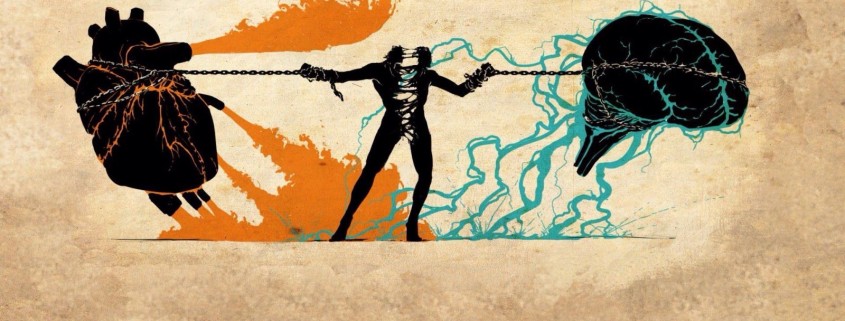Which is the compass for your life…your mind or heart?
The more I search, the more I get lost. The more I try to “figure out”, less I understand. My mind just loves to tinker, figure, explain, define, dissect, plan, define, and it is really great at it!! The downside to such mental gymnastics is that there is always a gapping void to satisfaction, which goads my mind to push further into trying to understand my self, my life further and further. They key word is TRYING, which leads to the inevitability of failure. It is far easier to think and/or reason what life is about. Feeling is the antithesis to reasoning. Feeling is not a faculty of the mind, but of the heart. Our culture emphasizes the use of the mind more so than the heart. Often referring to it as fools errand to follow such folly as listening to your heart.
The mind is an amazing tool, a set of cognitive faculties that enables perception, thinking, judgement, and memory. When the mind is the sole guide in the decision making process, it can prevent the heart from listening to the intuitive or spiritual side of our nature. In this state a person will look outside of the self for definition, purpose and approval. They will reminisce of the past or over plan for the future, sacrificing the present moment where one lives. “Worry never robs tomorrow of its sorrow; it only saps today of its’ strength (A.J. Cronin). In Chinese Medicine the Heart is considered the seat of consciousness, how we know ourselves from one another, what is our highest good and how can it be furthered along. When the Heart is obscured from information, making any and all decisions to fulfill our ultimate nature are hindered. A persons ultimate nature or Tao (path of life/purpose) or some refer to as dharma is imprinted in the DNA or residing in the Yuan Qi (original source qi).
Balancing the heart and the mind must be maintained in order to achieve our ultimate potential. It is only until emotional freedom has been obtained that such a balance can occur. If we navigate through life without “heart”, it is a life with no passion, or inspiration. When the mind is the sole navigator, it is like trying to find a path across a creek, looking for a stable enough stone to move onto. If every decision we took was a safe, dependable one, what kind of person would you be? The defining moments of our lives come from the unexpected turn of events that happen. A sudden death in the family, a promotion, winning the lottery, or being robbed, good or bad such events are life changing. It is how we “choose” to process such circumstance that defines us as a person. At some point through our lives some challenging moment(s) arise, leaving a “scar”, an emotional imprint. One that colors the way in which we meet life, an emotional theme that filters all circumstances in such a way that it creates a dispositional reaction.
In order to avoid the pain of this emotional imprint or wound, the mind navigates life like a mine field. Never engaging people or circumstances that trigger these seeds of pain. True emotional freedom is circumvented every moment, of everyday. The burden of protecting the emotional wounds prevents the heart from truly being open to experience life fully. Many chronic diseases stem from such patterned behaviors. There is a lack of drive, vitality, resignation, and despair that eventually develops, permeating into one’s life, which inhibits the progression of manifesting the fullest extent of their destiny’s potential.
When you hear someone say that woman has heart, they are actually saying, they have character, a depth because they have endured a hardship or if you will a heartship , an emotional event that required her to step beyond her limits, her normal ability to deal with life. Growth of character comes from transcending such emotional pain and/or taking risks that have uncertain outcomes. Much suffering can arise from patterned reactions in the processing of daily events. “Emotional manifestation can be worries. They also can be stemming from anger. This prevents the heart from maintaining emotional balance. Not able to pay attention, unable to unrecognized others for who they are… A moment of Qi that leads to the darkening of the consciousness.” (Elizabeth Rochat de la Valle’e).
So here is the obligatory self promotion. YES, acupuncture can be incredibly effective in helping heal emotional scars. One of the primary treating principles in Chinese Medicine is that “Qi follows thought”. The power of our thoughts have such powerful effects upon our bodies, and realities. There is an old Buddhist quote, “Mind your thoughts, they become your words. Mind your words, they become your deeds. Mind your deeds, they become your life.” An emotional scar has a tremendous amount of stuck Qi. Regular treatment can be highly effective in the healing/processing of such wounds. With the right practitioner, who can meet you where you are, who is an effective life coach and acupuncturist, your thoughts and feelings can shift in dramatic ways.
By: Kyle Chapin, L.Ac.


